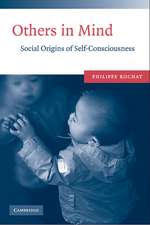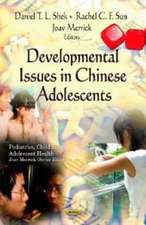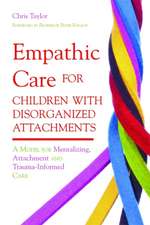Talking about Right and Wrong: Parent-Child Conversations as Contexts for Moral Development
Editat de Cecilia Wainryb, Holly E. Recchiaen Limba Engleză Paperback – 27 iul 2016
| Toate formatele și edițiile | Preț | Express |
|---|---|---|
| Paperback (1) | 357.89 lei 43-57 zile | |
| Cambridge University Press – 27 iul 2016 | 357.89 lei 43-57 zile | |
| Hardback (1) | 896.66 lei 43-57 zile | |
| Cambridge University Press – 19 mar 2014 | 896.66 lei 43-57 zile |
Preț: 357.89 lei
Nou
Puncte Express: 537
Preț estimativ în valută:
68.48€ • 71.69$ • 56.66£
68.48€ • 71.69$ • 56.66£
Carte tipărită la comandă
Livrare economică 07-21 aprilie
Preluare comenzi: 021 569.72.76
Specificații
ISBN-13: 9781107619630
ISBN-10: 1107619637
Pagini: 474
Ilustrații: 2 b/w illus. 10 tables
Dimensiuni: 152 x 228 x 25 mm
Greutate: 0.63 kg
Editura: Cambridge University Press
Colecția Cambridge University Press
Locul publicării:New York, United States
ISBN-10: 1107619637
Pagini: 474
Ilustrații: 2 b/w illus. 10 tables
Dimensiuni: 152 x 228 x 25 mm
Greutate: 0.63 kg
Editura: Cambridge University Press
Colecția Cambridge University Press
Locul publicării:New York, United States
Cuprins
Part I. Introduction: 1. Parent-child conversations as contexts for moral development: why conversations, and why conversations with parents? Cecilia Wainryb and Holly E. Recchia; Part II. Parent-Child Conversations: Contents, Contexts, and Consequences: 2. Family talk about moral issues: the toddler and preschool years Judy Dunn and Claire Hughes; 3. Remember drawing on the cupboard? New Zealand Māori, European, and Pasifika parents' conversations about children's transgressions Elaine Reese, Mele Taumoepeau and Tia Neha; 4. Taiwanese parent-child conversations for moral guidance: uncovering the ubiquitous but enigmatic process Jin Li, Heidi Fung and Eva Chian-Hui Chen; 5. Constructing moral, emotional, and relational understanding in the context of mother-child reminiscing Deborah Laible and Tia Panfile Murphy; 6. Caught red-handed: how Italian parents engage children in moral discourse and action Laura Sterponi; 7. Parent mediation of sibling conflict: addressing issues of fairness and morality Hildy Ross; 8. Judging fairness in the face of gender stereotypes: examining the nature and impact of mother-child conversations Lacey J. Hilliard and Lynn S. Liben; 9. Discussions of moral issues emerging in family conversations about science Maureen Callanan, Araceli Valle, Megan Luce and Jennifer Rigney; 10. 'Did you apologize?' Moral talk in European American and Chinese immigrant mother-child conversations of peer experiences Qi Wang and Qingfang Song; 11. Mother-child conversations about hurting others: supporting the construction of moral agency through childhood and adolescence Holly E. Recchia and Cecilia Wainryb; 12. Voice and power: constructing moral agency through personal and intergenerational narratives Robyn Fivush, Natalie Merrill and Kelly Marin; Part III. Parent-Child Conversations: Processes and Mechanisms: 13. Moral development, conversation, and the development of internal working models Ross A. Thompson and Abby C. Winer; 14. Parent-child conversations from the perspective of socialization theory Joan E. Grusec; 15. Conversations in the home: the role of dialogue and resistance in children's emerging understandings of morality, convention, and the personal Larry Nucci; 16. Constructing the good enough self: mother-child conversations and moral development from an identity framework Monisha Pasupathi; 17. Placing discursive practices front and center: a sociocultural approach to the study of early socialization Peggy J. Miller.
Recenzii
'Common sense tells us that parents teach morality as part of raising their children but developmental theory tells us that children actively construct morality in the course of social interaction. In Talking about Right and Wrong, top contemporary researchers show us how to reconcile these two views of moral development.' David Moshman, University of Nebraska, Lincoln
'This volume provides a new and much needed perspective on research about relationships between children and parents. Instead of the common emphasis on how parents influence children's moral development, the wide-ranging chapters in this volume explore how children and parents interact regarding morality through their conversations. The editors have done a masterful job of bringing together leading researchers in discussions that will reshape how we think about the active roles of both children and parents in the process of the development of morality.' Elliot Turiel, University of California, Berkeley
'This volume provides a new and much needed perspective on research about relationships between children and parents. Instead of the common emphasis on how parents influence children's moral development, the wide-ranging chapters in this volume explore how children and parents interact regarding morality through their conversations. The editors have done a masterful job of bringing together leading researchers in discussions that will reshape how we think about the active roles of both children and parents in the process of the development of morality.' Elliot Turiel, University of California, Berkeley
Descriere
This book illuminates the conversations that parents and children have about right and wrong, and how these conversations affect children's moral development.









